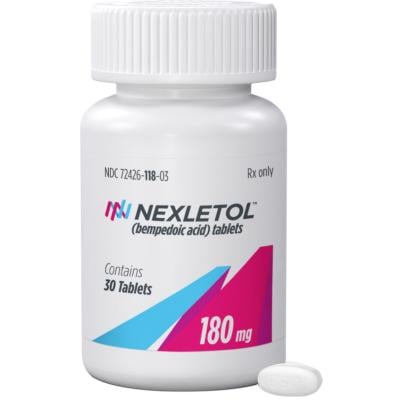
December 8, 2022 — Esperion announced that the landmark Cholesterol Lowering via Bempedoic acid, an ACL-Inhibiting Regimen (CLEAR) Outcomes trial met its primary endpoint, demonstrating statistically significant risk reduction in MACE-4 in patients treated with 180 mg/day NEXLETOL compared to placebo.
“With the announcement of these positive topline results, bempedoic acid becomes the first ATP-citrate lyase inhibitor to demonstrate significant and clinically meaningful outcomes results for patients in whom existing lipid lowering therapies fall short,” said Sheldon Koenig, President and CEO of Esperion. “We thank the thousands of patients and investigators worldwide for bringing this study to a successful close. We look forward to sharing this data with the medical community and submitting to appropriate regulatory authorities as quickly as possible in 2023. CLEAR Outcomes further strengthens the clinical evidence supporting the role of bempedoic acid for patients.”
Cardiovascular disease remains the number one killer globallyi. A large proportion of patients at risk for cardiovascular events based on elevated LDL-cholesterol and apolipoprotein b are not adequately treated with existing therapies. Despite recent therapeutic advances, there remains a significant need for new treatment options to help improve long-term cardiovascular outcomesii.
CLEAR Cardiovascular Outcomes Trial
CLEAR Outcomes is a Phase 3, event-driven, randomized, multicenter, double-blind, placebo-controlled trial designed to evaluate whether treatment with bempedoic acid reduces the risk of cardiovascular events in patients with or who are at high risk for cardiovascular disease with documented statin intolerance (inability to tolerate two or more statins, one at a low dose) and elevated LDL-cholesterol levels (fasting blood LDL-C ≥ 100 (2.6 mmol/L)). The study included over 14,000 patients at over 1,200 sites in 32 countries.
INDICATION
NEXLETOL is indicated as an adjunct to diet and maximally tolerated statin therapy for the treatment of adults with heterozygous familial hypercholesterolemia or established atherosclerotic cardiovascular disease who require additional lowering of LDL-C.
Limitations of Use: The effect of NEXLETOL on cardiovascular morbidity and mortality has not been determined.
IMPORTANT SAFETY INFORMATION
Warnings and Precautions: Hyperuricemia: NEXLETOL may increase blood uric acid levels. Hyperuricemia may occur early in treatment and persist throughout treatment, and may lead to the development of gout, especially in patients with a history of gout. Assess uric acid levels periodically as clinically indicated. Monitor for signs and symptoms of hyperuricemia, and initiate treatment with urate-lowering drugs as appropriate.
Tendon Rupture: NEXLETOL is associated with an increased risk of tendon rupture or injury. In clinical trials, tendon rupture occurred in 0.5% of patients treated with NEXLETOL versus 0% of patients treated with placebo, and involved the rotator cuff (the shoulder), biceps tendon, or Achilles tendon. Tendon rupture occurred within weeks to months of starting NEXLETOL. Tendon rupture may occur more frequently in patients over 60 years of age, patients taking corticosteroid or fluoroquinolone drugs, patients with renal failure, and patients with previous tendon disorders. Discontinue NEXLETOL at the first sign of tendon rupture. Avoid NEXLETOL in patients who have a history of tendon disorders or tendon rupture.
Adverse Reactions: In clinical trials, the most commonly reported adverse reactions were upper respiratory tract infection, muscle spasms, hyperuricemia, back pain, abdominal pain or discomfort, bronchitis, pain in extremity, anemia, and elevated liver enzymes. Reactions reported less frequently, but still more often than with placebo, included benign prostatic hyperplasia and atrial fibrillation.
Drug Interactions: Simvastatin and Pravastatin: Concomitant use results in increased concentrations and increased risk of simvastatin or pravastatin-related myopathy. Use with greater than 20 mg of simvastatin or 40 mg of pravastatin should be avoided.
Lactation and Pregnancy: It is not recommended that NEXLETOL be taken during breastfeeding. Discontinue NEXLETOL when pregnancy is recognized, unless the benefits of therapy outweigh the potential risks to the fetus. Based on the mechanism of action, NEXLETOL may cause fetal harm.
Please see full Prescribing Information here.
For more information: https://www.esperion.com/
References:
i Centers for Disease Control and Prevention, National Center for Health Statistics. About Multiple Cause of Death, 1999–2020. CDC WONDER Online Database website. Atlanta, GA: Centers for Disease Control and Prevention; 2022. Accessed November 2022.
ii Ray KK, Ference BA, Séverin T, Blom D, et al. World Heart Federation Cholesterol Roadmap 2022. Global Heart. 2022; X(X): X. DOI: https://doi. org/10.5334/gh.1154)


 February 03, 2026
February 03, 2026 









